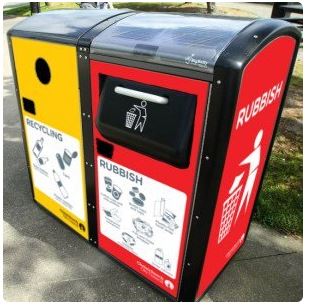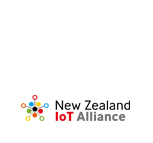“Bigbelly solar-powered compacting rubbish bins have been used in New Zealand, and around the world, for some time. Christchurch is the first major city in New Zealand to trial these compacting bins. The bin sends real time data to contractors telling them when they need to be emptied, resulting in fewer truck rolls and improved public satisfaction”
Source: Smart Cities Christchurch
Bigbelly solar-powered compacting rubbish bins have been used in New Zealand, and around the world, for some time. Christchurch is the first major city in New Zealand to trial these compacting bins.
HOW BIGBELLY BINS WORK
Each Bigbelly bin is equipped with a solar-powered compactor. A sensor inside the bin activates the compactor when the rubbish gets to a certain level. Crushing the contents enables a Bigbelly bin to hold up to six times more waste than a standard rubbish bin.
The bin sends real-time level data to a dashboard that lets contractors and city operational leaders know how full the bin is, and when it needs emptying. They can also use historical data to manage the waste management assets and process more efficiently. The system sends fullness alerts to contractors, so they know if a bin needs urgent attention.
NEW BRIGHTON WHALE POOL TRIAL
A pair of Bigbelly bins, one for rubbish and one for recycling, was installed for a six-month trial at the New Brighton Whale Pool playground in February of 2017.
As a popular summer recreation spot, the playground was selected for the trial because it had a serious problem with overflowing bins. Contractors emptied the bins up to three times a day, but still couldn’t keep up with the rubbish. The wind and seagulls would pick up the litter and scatter it around. Residents and visitors frequently complained about the mess, smell, environmental impact of litter blowing into the sea, and potential health and safety risks for children using the playground.
RESULTS OF THE TRIAL
LANDFILL WASTE
The rubbish trial was a success, and the rubbish bin has been incorporated into Council’s operational service. Some of the key outcomes were:
- Waste contractor visits reduced from 14—21 times a week to just 1—2 times a week.
- The Whale Pool area was cleaner and tidier, and negative feedback about overflowing rubbish (via calls to Council, and comments on social media) was eliminated.
- Positive feedback was received from the “New Brighton guardians”, who used to pick up several plastic bags of litter from the Whale Pool area. They said they rarely had to pick rubbish up once the Bigbelly bins were installed.
- Rodents and seagulls can’t get the Bigbelly bins’ solid access flaps open, so they can’t get at the contents and scatter rubbish that litters the park and ultimately blows into the sea. The fully enclosed bins attract fewer pests to the area.
RECYCLABLE ITEMS
The recycling trial demonstrated that more work is needed to get a sustainable public-waste recycling solution. Some of the key outcomes were:
Local Christchurch waste advocacy organisation Our Daily Waste had research showing 25 per cent of material placed in public recycling bins is contaminated. Most of this is food-contaminated items such as coffee cups, takeaway food containers, and fish and chip wrappers.
When there are too many non-recyclable items in a recycle bin, EcoCentral, our recycling plant, will not accept contents for recycling. The Smart Cities Programme investigated how we could send uncontaminated recycling to EcoCentral.
We contracted Our Daily Waste to sort the recycling on-site for the duration of the trial. Despite the commitment of the staff to sort this recycling in all seasons, the solution was operationally unsustainable for Council, and had the potential for health and safety risks for the staff of Our Daily Waste.
WHAT’S NEXT?
The trial proved beyond doubt that compacting bins and prompt alerts for contractors make a big difference in waste management, especially in places where usage varies widely and large volumes of rubbish are generated quickly. More Bigbelly bins have been installed at high-demand locations around the city, including Sumner.






